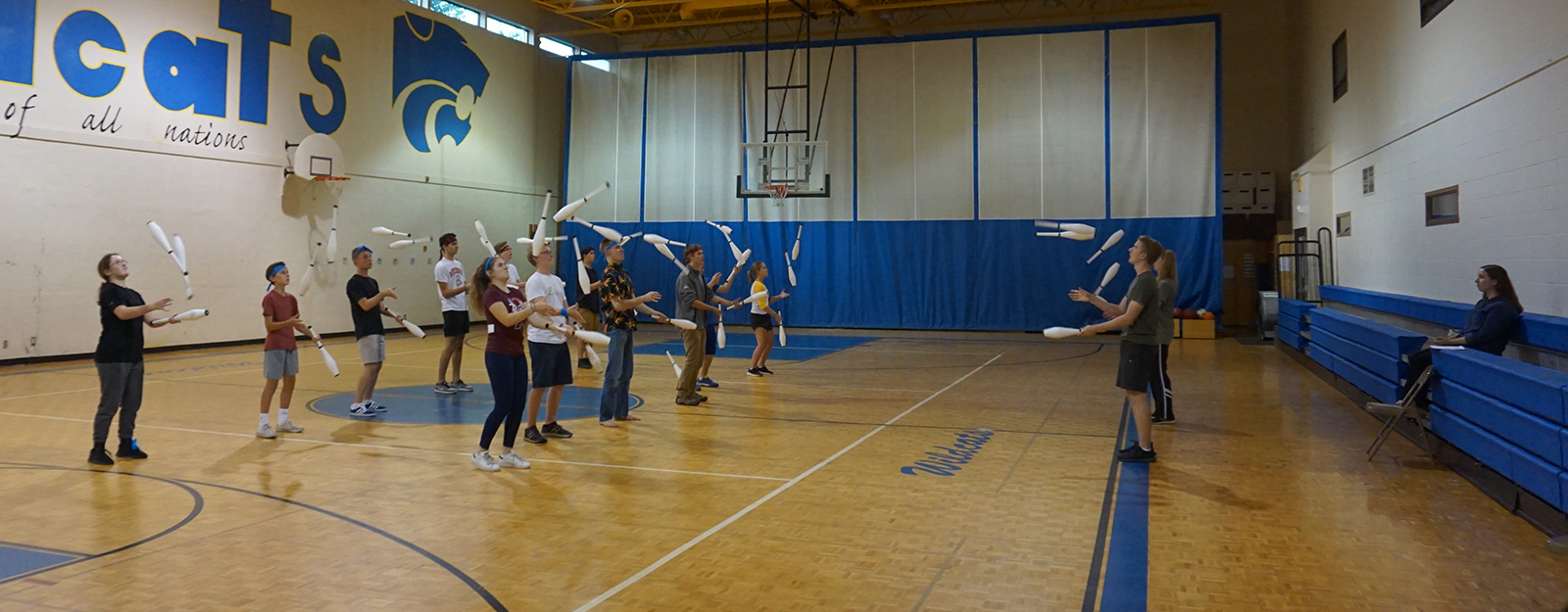By Erica Liddle
—5-Year Jughead (Class of ’14); Advanced, Elite & Ultimate Club Coach; Juggle Jam 22 Assistant Director
If you’ve read the JUGHEADS Journal or spoken with Paul lately, you know that a significant motivation for his recent coach/specialist hiring is a desire for daily adult leadership backup. Another adult’s presence helps facilitate and monitor club activity. And, during Juggle Jam season, these helpers significantly reduce the stress of planning, choreographing, and conducting rehearsal for every moment of every club routine. Such margin in daily operation is essential. It frees Paul for more one-on-one work with students, office productivity, and a general sense of focused relaxation.
“But,” you may ask, “isn’t this club-day assistance the role of the Assistants? Can’t the Student Leadership Team (SLT) fill this role? They – and the rest of Elite Club – did a great job last year with the student-driven ‘Stomp’ routine.” Good question, my hypothetical reader.
To begin answering your question, let’s assess what the SLT is. The SLT is a collection of upperclassmen Jugheads who attend an additional club each week to connect with and assist other students. These leaders have chosen to be fountains rather than drains. (Think about that analogy for a moment…) SLT members are not appointed by Paul or the coaches. Rather, they ask to be on the team and fill out an application form. If there is room, they are old enough, have adequate juggling ability, and demonstrate a willingness to teach and be taught, they may join the team – first as a Volunteer and then as an Assistant. Like most leaders in life, Assistants are people who take initiative. They lead workshops, mediate disagreements, choreograph vignettes, spearhead portions of rehearsal, et. al. It’s a unique and notable role.
Talented, creative, relational initiators though they are, the student leaders are just that: a team of student leaders. No one, student or otherwise, is too old, sophisticated, or advanced for mentorship.
In the field of psychology, there is a widely recognized model called Maslow’s hierarchy of needs. The concept is illustrated by a five-tiered pyramid that works from the bottom up. To develop, individuals must progress through each level of the pyramid in ascending order:
- Physiological: air, water, food, shelter, rest, etc.
- Safety: personal security, resources, health, etc.
- Love and Belongingness: friendship, intimacy, family, connectivity.
- Esteem: respect, self-esteem, recognition, freedom.
- Self-Actualization: the desire to become the best they personally can be.
Most, if not all, Jugheads have plenty of food and a safe home. But all can deepen friendships, cultivate respect for others and self, and consistently choose to improve instead of settle or regress. If coaches intentionally foster these developments in the SLT, the SLT members are empowered to do the same for the students they assist.
I believe coaches are fundamental to Jugheads’ thriving. This opinion isn’t motivated by the fact that I’m a coach; it’s actually a large part of why I coach. When I was on the SLT, my coaches – Billy Watson, Scott Richter, Stephen Brancel, Kelvin Ying – were inspirational catalysts for much of my growth. A JUGHEADS coach is a mentor of student mentors.
With their additional years of life and juggling experience, coaches and specialists offer clubs a broader and deeper level of aid than the SLT can alone. These diversely gifted teens are simply at an earlier stage of leadership, and it is a coach’s privilege to speak into that leadership development. That’s what we do at JUGHEADS: “Develop Youth Through Juggling Since 1994.”
At club, coaches make a point to greet all students by name. They think big-picture, working to challenge fast achievers and demonstrate patience with slow learners for the growth of the club as a whole. They engage the outgoing and include the lonely. They listen to Juggle Jam ideas and then synthesize them to create a unified vision. For the student leader who pays attention, a coach can become a valuable model. This model isn’t perfect. But it is a model from which developing leaders can learn leadership techniques that they may choose (or perhaps choose not) to imitate.
So, back to our original question. Do we really need coaches and specialists at JUGHEADS?
Yes. Yes, yes, yes.
Coaches are an essential part of the mentorship model that makes JUGHEADS unique. From Paul to the newest Rec. Rookie, coaches benefit everyone in the company. As a member of this year’s adult staff, I pray that we may be mentor fountains, helping you develop into the best you can be – in juggling and in life.
